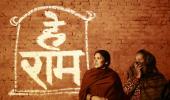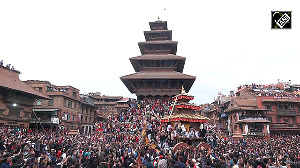Deity 'Bhagwan Sri Ram Lalla Virajman' emerged as the clear winner on Saturday in the protracted Ram Janambhoomi-Babri masjid land dispute with the Supreme Court directing the Centre to grant the disputed 2.77 acre land to a trust for constructing a temple in Ayodhya.

The 1989 lawsuit filed on behalf of the presiding deity, represented by a next friend, had sought a declaration that the "entire premises of Sri Ram Janambhoomi" be decreed in its favour for the construction of a new temple and other parties including Uttar Pradesh Sunni Central Wakf Board be prohibited from obstructing it.
A 5-judge Constitution Bench headed by Chief Justice Ranjan Gogoi, in its historic verdict delivered on a court holiday, held that the lawsuit of the deity was "within the period of limitation" and granted the title decree in its favour.
The bench, however, did not agree with the contention of former Attorney General K Parasaran and senior advocate C S Vaidyanathan that besides the deity, the birth place was also a juristic entity capable of filing the lawsuit.
"Suit 5 (to which the deity was the first plaintiff and the birth place was second one) is held to be maintainable at the behest of the first plaintiff (Ram Lalla) who is represented by by the third plaintiff (next friend)," said the bench which also comprised Justices S A Bobde, D Y Chandrachud, Ashok Bhushan and S A Nazeer.
In its unanimous, 1,045-page verdict, the bench said: "The central government shall, within a period of three months from the date of this judgment, formulate a scheme" under the Acquisition of Certain Area at Ayodhya Act, 1993.
"The scheme shall envisage the setting up of a trust with a board of trustees or any other appropriate body... The scheme to be framed by Central Government shall make necessary provisions in regard to the functioning of the trust or body including on matters relating to the management of the trust, the powers of the trustees including the construction of a temple and all necessary, incidental and supplemental matters."
Rejecting challenges to the lawsuit of the deity, it said the possession of "inner and outer courtyards" be handed over to the trust or to the body so constituted.
Paving the way for the construction of a temple, the court said the Centre will be "at liberty" to make changes in legal provisions for giving to the trust the 68 acres of land, besides the disputed 2.77 acre area, which were acquired by it in 1993.
It said till the time such an arrangement to grant the property to the trust is notified, the disputed land "shall continue to vest in the statutory receiver".
The top court, however, directed the Centre or the state government to simultaneously hand over a suitable plot of five acres to Sunni Waqf Board for construction of a mosque in Ayodhya.
As many as 27 persons, including Sunni Wakf Board were made parties in the lawsuit filed on behalf of deity through its next friend Deoki Nandan Agarwala.
Significantly, the UP government decided not to contest the lawsuit which was premised on the fact that deity and the birthplace are "juridical persons" and none of the earlier lawsuits, filed by Nirmohi Akahara and devotee Gopal Singh Visharad, adequately put forth their case claiming title over the property.
"The deity, being indestructible, continues to exist so long as the place exists, and the place being land, continues to exist irrespective of any construction on it," the plea said.
The lawsuit relied on various travelogues and gazetteer including the 1928 edition of Faizabad Gazetteer to establish that there was an ancient temple which was allegedly destroyed by Babur in 1528 and the mosque was built largely with the materials of destroyed temple including Kasauti pillars.
The top court did not allow the vehement submission of Nirmohi Akhara that the lawsuit of the deity, instituted through a next friend, was "malicious" and designed to damage its title over the land as 'shebait' (devotee).
The maintainability of the lawsuit of the deity hinged on the question whether Nirmohi Akhara were 'shebaits' or not, the bench said, adding that though, the deity itself was capable of holding property and institution the case.
The bench termed as "untenable" the stand of Akhara that it will not oppose the deity if its 'shebaiti' rights are not challenged by the counsel of the deity.
In the absence of "exclusive possession of the inner courtyard" of Akhara, its claim that it was managing the inner courtyard as 'shebait' does not arise.
Muslim parties led by Sunni Wakf Board denied the juridical status of the deity and alleged that their (Muslims) possession have been uninterrupted and continuous since the construction of the mosque up to December 23, 1949.
The court also rejected the objections that the lawsuit of the deity was time barred and the principle of 'res judicata', which says that a dispute cannot decided in a court twice, would apply in the instant case.
"Significantly, even after the attachment of the disputed property on December 29, 1949 the 'seva-puja' of the deities continued. Therefore, it cannot be contended that the cause of action ...arose on 29 December 1949...," it said.











 © 2025
© 2025